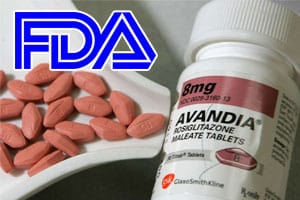
A vote at the conclusion of a two-day meeting of United States health advisors ended with a recommendation to ease current market restrictions on Type 2 diabetes drug, Avandia, which is marketed by GlaxoSmithKline. The U.S. Food and Drug Administration (FDA) advisory committee was split, according to Reuters. Now, the FDA will consider the vote […]
 A vote at the conclusion of a two-day meeting of United States health advisors ended with a recommendation to ease current market restrictions on Type 2 diabetes drug, Avandia, which is marketed by GlaxoSmithKline.
A vote at the conclusion of a two-day meeting of United States health advisors ended with a recommendation to ease current market restrictions on Type 2 diabetes drug, Avandia, which is marketed by GlaxoSmithKline.
The U.S. Food and Drug Administration (FDA) advisory committee was split, according to Reuters. Now, the FDA will consider the vote prior to making a final decision on how Avandia (rosiglitazone) can be used.
Avandia belongs to a class of diabetes drugs called thiazolidinediones that lower blood sugar by decreasing insulin resistance. Since November 2007, Avandia’s U.S. label has included a black box warning detailing its association with heart attacks. The black box was added after Dr. Steven Nissen of the Cleveland Clinic published a study showing that patients taking Avandia had a 40 percent increase in the risk of cardiovascular disease. Since 2007, more evidence of Avandia’s heart risks has accumulated and thousands of lawsuits have been brought against GlaxoSmithKline over the blockbuster drug. In 2010, the FDA placed severe restrictions on sales of Avandia after determining its heart risks outweighed its benefits.
Although the committee was not tasked with considering a change in Avandia’s protocol, 13 of the 26 panel members backed modification and recommended that current restrictions mandating prescribing physicians and pharmacists to be certified should either be eased or eliminated, according to Reuters. Some members sought a new clinical trial; some, the creation of a registry to monitor Avandia patient health.
“In general, this drug doesn’t look any different than any other diabetes drug,” Dr. William Hiatt, a cardiologist from the University of Colorado and who was one of the seven experts who recommended a total lifting of the restrictions, told Reuters. Five of the panel were in favor of maintaining today’s sales restrictions and one voted for a complete withdrawal of Avandia. Today, Avandia is the drug of last resort for those people diagnosed with Type 2 diabetes who are so ill that heart attack is considered a risk worth taking, according to The New York Times.
Glaxo said it has no plans to advertise Avandia. “We continue to believe that Avandia is a safe and effective treatment option for type 2 diabetes when used for the appropriate patient and in accordance with labeling,” Dr. James Shannon, Glaxo’s chief medical officer, said in a statement, according to Reuters.
Dr. Nissen has long said that Avandia is too dangerous for use in diabetes treatment and is among a group of experts that says that the FDA’s revisiting of this drug is not about protecting patients, but about saving face, according to The Times. “The efforts to whitewash this entire affair is really an unacceptable misuse of their regulatory role,” Dr. Nissen told The Times, adding that he would be “horrified” if the panel recommends removal of current restrictions. “The evidence against this drug is overwhelming,” he said previously.
Glaxo previously announced that it was paying $3 billion to settle U.S. criminal and civil investigations into whether it marketed the diabetes drug and other medications illegally and agreed to cease marketing Avandia as a treatment for Type 2 diabetes, respecting the demands of the FDA and other regulatory agencies worldwide, which all then believed the drug carried a risk of causing heart attacks and stroke more than other available treatments. Glaxo never noted those risks in any clinical data; however, those filing lawsuits believe the company had been presented ample evidence of those risks.
Glaxo was also the focus of a federal investigation since 2004 over alleged illegal marketing and suppression of negative evidence on the side effects of Avandia and several other of its top-selling drugs. In fact, a previous Bloomberg News report cited a 2007 incident in which a University of North Carolina professor told U.S. officials he was pressured by Glaxo to mute his criticisms of Avandia, specifically related to its link to heart attacks and stroke, ever since the drug was first introduced in America in 1999.
Avandia’s use was also withdrawn from the European market in 2010 over potential heart attack and stroke risks, noted Reuters. Only 3,000 people in the U.S. take Avandia today, a significant decrease from the 120,000 prior to the restrictions.


